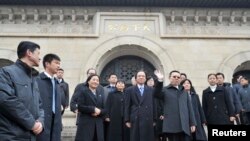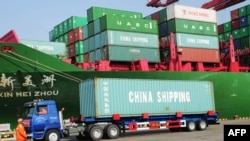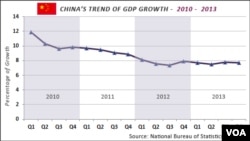Welcome to As It Is from VOA Learning English. Today, we hear about China’s economy. Growth in China is heavily led by exports. Now, other considerations, including the level of consumer spending, could also be influencing China’s numbers.
But first, we hear about new developments in relations between mainland the two sides. Christopher Cruise has this report.
A Meeting Almost Impossible to Imagine
Top officials from China and Taiwan held historic talks last week for the first time in 65 years. These talks opened a new chapter in relations between China and Taiwan.
Wang Yu-chi, head of Taiwan’s Mainland Affairs Council and Zhang Zhijun, head of China’s Taiwan Affairs Office, met officially in Nanjing. Both men expressed surprise that they were able to hold official meetings in the first place. They were also surprised that the talks were organized in only four months.
China and Taiwan share a very complex past. The two still do not officially recognize each other. China’s Zhang Zhijun says relations between China and Taiwan need imagination to move forward.
Mr. Zhang says that in the past this meeting would be impossible to imagine. He adds that both sides must use imaginative ways to resolve problems that still exist between the two sides.
Taiwan’s Mr. Wang says these talks gave the two Asian rivals an opportunity to speak openly about difficult issues.
Mr. Wang says the meeting has improved relations. He adds that it is not easy to discuss the long-standing problems between the two. But he adds that these talks will move relations between China and Taiwan forward.
An imaginative solution can be as simple as location. Joseph Cheng is a political scientist. He explains the importance of holding the talks in Nanjing.
"The nationalist government first established the capital in Nanjing, so this is much more acceptable from Taipei's point of view, and certainly one can refer to the fond memories of Dr. Sun Yat-sen in Nanjing.
Mr. Cheng adds that meeting in Nanjing instead of Beijing is good for Taipei.
“Being able to avoid Beijing is a very, very small victory on the part of Taipei."
During the visit Mr. Wang visited the burial site of Sun Yet-se, the founder of modern China. At the burial site, he also praised Taiwan’s democratic successes. Mr. Wang visited the former presidential office of Chiang Kai-shek. This former office is now a museum of modern Chinese history.
The talks between Chinese and Taiwanese officials produced no formal agreements. But the talks laid the groundwork for future communication between the two. Mr. Wang invited Mr. Zhang to visit Taiwan in the near future. Mr. Zhang expressed his desire to visit Taiwan as soon as the time was appropriate. But that date has not been set.
I’m Christopher Cruise.
You are listening to As It Is. I’m Mario Ritter.
Why the Chinese Economy Could Slow This Year
China’s economic growth has slowed, settling at 7.7 percent last year. Some economists blame a lack of consumer spending for the decrease. Steve Ember has this report on China’s economy.
Ma Jiantang is director of China’s National Bureau of Statistics. He says it is no easy job to keep growth at over seven percent and inflation low at the same time. That is made more difficult by the size and nature of China’s economy, the world’s second largest. Mr. Ma says this combination, of high growth and limited inflation, is unusual in the world.
China’s economy had 10 percent growth rates in the years before the world financial crisis of 2008. That economic expansion resulted from big trade surpluses and foreign investment. Now, says Ma Jiantang, China is seeking to move away from that growth model. The country is working to balance exports with demand at home.
Recently released information shows that household spending in China remains lower than in most economies. Chinese government estimates put household spending at about 36 percent of all goods and services produced within the country. That is down from 49 percent in 1978. By comparison, Thailand’s household spending represents 56 percent of its economy.
Some experts dispute the belief that China’s personal consumption is so low. They say businesses often buy goods for their employees to avoid taxes. This means companies are increasing demand for household goods by buying them directly.
Chinese officials say they want to reduce the economic influence of state-controlled businesses and to let market forces shape the economy. However, economists expect China’s growth to slow in the coming years. How quickly that happens depends on several issues.
The recovery of the United States and European economies means rising demand for Chinese exports. One issue that might slow growth is the expanding load of local government debt. That debt is estimated at about $3 trillion, or about one third of the size of the economy. China has long tied its estimate of local officials on their ability to grow the economy.
Reforms are possible, but some could slow economic growth. The government is moving away from growth to areas such as environmental protection and the ability of local officials to contain debt. Experts say that could also weaken investment and slow growth.
Thank you for joining us today. We bring you a new As It Is every day at 0030 hours Universal time. I’m Mario Ritter from Washington.
Tell us what you want to hear about. Go to our website, learningenglish.voanews.com and click on “Contact US.”
You can also follows us on Facebook, YouTube and Twitter.
And listen to VOA world news at the beginning of every hour Universal Time.
We are sorry, but this feature is currently not available








